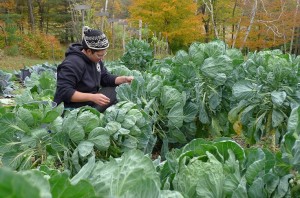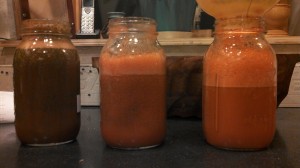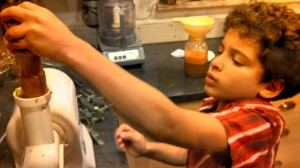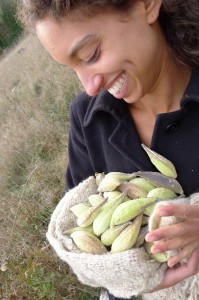Contents of Share this Week
- kale (1 bunch)
- chard (1 bunch)
- winter squash
- celery or carrots
- red or green cabbage
- beets (2)
- jumbo onion or scallions (bunch)
- 1 dozen eggs or 1 quart sprout mix (brown lentil, mung bean, zesty mustard mix)
Announcements
- Tomorrow! Saturday, October 20, 8-12am we are slaughtering the final chickens for the season. If you are interested in joining us to volunteer or just watch, this is your final chance for the season.
- Pre-order your whole chickens here. We can deliver with you shares.
- RETURN YOUR BOXES PLEASE. Thanks for all the bowes last week, keep em coming.
- Remember that you are always welcome to visit socially and/or to volunteer. Give a call to schedule a time.
- All of our newsletters are archived on our website http://www.soulfirefarm.com/?cat=3
- Please also like us on Facebook. There are larger picture albums there, and more being added each week.
- Next week is the final share of the season.
Food Justice
This weeks piece is a visionary call to action about the interwoven worlds of food justice and mental health. Emma Heath-Engel puts forth a vision that is just that: a vision. However, whether or not the centers she is proposing below come into existence, she is bringing a powerful and essential awareness to the devestating reality of the mental health situation, and the need for radical healing. If you are interested in learning more, please contact her, i know I will be.
The Initiative for Food Justice and Mental Health: Launching Centers for Creative Sustainable Maladjustment
The movements for justice in food systems and mental health care systems are intricately connected due to the ways in which food systems affect mental health care systems on all levels. For instance, a large number of diverse sources support strong, integral connections between what we ingest and our states of mind (see resource list below: Food and Mood: Partners in Crime). Both movements work to dismantle oppressive, exploitative systems which have roots in colonial practices (see MFI info on racism and Race and The Food System, The Growing Food and Justice For All Initiative .)
Thus, it is essential that those working to dismantle oppression within food systems and those working to do the same in mental health systems join forces.
The MindFreedom Initiative on Food Justice and Mental Health, and the creation of Centers for Creative, Sustainable, Maladjustment are an attempt to do just this.
While the Initiative aims to form connections between these movements through creating dialogue, sharing ideas and resources, and cross pollinating events, gatherings, and conferences, the Centers for Creative Sustainable Malajustment will be spaces in which unhealthy connections between food systems and mental health systems are actively being disconnected. These Centers will, all in all, be healthy alternatives to what is unhealthy and unjust within current food and mental health systems.
These centers, as the name suggests, also represent an attempt to honor and build on Reverend Martin Luther King’s use and creation of the term ‘creative maladjustment’ and his support for the ‘creatively maladjusted’. Indeed, in a speech in front of the American Psychological Association in 1967 he declared that “.. it may well be that our world is in dire need of a new organization, The International Association for the Advancement of Creative Maladjustment.”
The Centers for Creative Sustainable Maladjustment (CCSM) will focus on supporting and empowering those who are working to escape or heal from being entangled in the mental health system in one way or another. They will also be open to anyone who wishes to contribute to the maintenance and growth of the initial CCSM, as well as to the creation of more similar spaces. They will be spaces where individuals can seek refuge in times of crisis, which normally lead to ending up in a psychiatric ward, diagnosed with a mental illness, and forced to take psychiatric drugs.
The CCSMs will be built on the model of a contained urban food center similar to the amazing Growing Power in Milwaukee, Wisconsin (http://www.growingpower.org/) and will be producing lovingly grown, organic, healthy food, suitable for a range of dietary needs. They will be feeding surrounding communities, as well as residents, volunteers, and staff, and profits made from the sale of produce to surrounding communities will return back into the centers to facilitate and ensure their continued functioning.
With this as the foundational model, these centers will also offer a wide range of healing modalities and consciousness raising workshops, including, but not limited to horticultural therapy, integrative arts therapy, energetic healing modalities passed down from thousands of years of wisdom, designed to help shift negative relationship and life patterns, dismantling oppression trainings, physical and spiritual fitness training, and nutritional guidance and therapy, drawing on a multitude of cultural traditions.
Volunteers and residents will have the opportunity, and be encouraged to train to become able to teach the various modalities offered, as well as to be able to set up similar centres themselves, again drawing on Growing Power’s training centre model. Priority attendance will be given to those who are survivors of, or attempted escapees of the psychiatric system, and to those with least resources.
In essence, these spaces will allow those who often fall through the cracks in society and end up in a deadly cycle of medication and mental health labels, to have the space, time, comfort, freedom, resources, and support, to be who they are and want to be, and to exist in the way they feel best. In so doing, individuals will be able to become part of the movement to revolutionize our current food systems and mental health systems, which are the source of so much suffering. Of course, no one will be allowed or encouraged to realize desires to create harm in any way.
These centers will initially be located where there is already considerable interest and support such as Eugene Oregon, Toronto, Ontario, Ghana, Nablus, Palestinian Territories, and Ireland. Depending on how things go, many other locations are possible.
These spaces are a work in progress, though many elements of their realization are on their way to being completed. This is a call for suggestions, recommendations, input of any kind, and, most importantly a call for everyone interested in being involved in the creation of such spaces to join forces, start talking, and start helping making these centers functioning realities!!
If this sounds like something you would like to be involved in in any way, or if you have any input, please send an e-mail to: emheathengel@gmail.com Also send an e-mail to this address to be connected to our listserv, which will allow you to receive related information and links.
Recipe – Roasted Winter Squash
Ingredients
1 butternut squash or equivalent of other squash
extra virgin olive oil, for drizzling
salt
freshly ground black pepper
2 teaspoons finely chopped fresh herbs like thyme, rosemary, or sage, (optional)
honey or maple syrup, for drizzling (optional)
Directions
- Preheat the oven to 400°F.
- Slice the stem off of the top of the squash and remove the bottom. With a strong vegetable peeler, remove and discard the squash’s skin.
- Cut the squash in half down the middle. Remove and discard the seeds.
- Slice the flesh into 1/4-inch dice and place on a baking sheet lined with foil.
- Liberally drizzle with olive oil and season with salt. If desired, sprinkle with the herbs and drizzle with the honey or syrup. Toss to combine.
- If using the squash for a salad, roast in the oven for 15-20 minutes (tossing once to rotate) until the squash is tender. If you plan on pureeing the squash, roast for 40-50 minutes until its very soft and beginning to brown.
Depending on the size of your squash, you should have 2-3 cups.
Farm News
The powerful and abundant winds and rains these past few weeks have been a potent reminder that fall is here. All but a few rebellious leaves have fallen to the ground, the plants are growing slowly, and the hoses are frozen for morning chores. As the final harvests come in from the fields, we are starting to rotate the chickens through the gardens to eat the last of the veggies, fertilize the soil, and eat weed seeds. After the chickens move out we lay down a thick blanket of hay for the winter.
If you have been here anytime recently, you’ve probably noticed we have a lot of chickens around. This is because our laying hens are close to two years old and getting ready for retirement. The younger chickens will have some big shoes to fill. After next week’s share, we will be saying goodbye to these birds as they find new homes all over the area. If you are interested in your very own pet chickens, let us know.
Fall for us on the farm also means transition. As with any transition time, lessons and space for growth abound. We have already started planning and strategizing for next season, putting food away for the winter, including juicing lots of carrots, and preparing the farm for winter. The expanded gardens are near ready, we are stocking up on bales of hay. It also always seems to be the case that the end of the growing season means the list of infrastructure projects grows. No matter how hard I try to keep on top of these projects, and swear to myself that I will not be working with cold fingers this year, this always happens. I think its time to surrender to the seasons.
Tomorrow is our final chicken slaughter of the season. As usual, we welcome it with gratitude and intention. It is an integral part of our sustainable farm system here, but also gives us an opportunity to share the skills, experience, and modality in which we approach things. Someone asked me about bringing children. My response was this:
They are welcome. We have two children aged 7 and 9 1/2. The older one is vegetarian. My wife is also vegetarian. The chickens are part of a larger sustainable farm system, which is in turn part of a larger ecosystem picture, which is ripe with opportunities to talk and teach young people about the cycles of life and death and their importance in our world. Nothing is unconnected. Our children love slaughter day and participate in any number of ways, including offering prayers of thanks in preparation, weighing and labeling, helping with cooking lunch, playing music.
The first time we ever did it several years ago, our older daughter sat and read a book nearby the entire day. Our younger son kept by our side the whole time, occasionally crying and needing hugs, but all the while in honest conversation about what was happening. We as adults and parents pass on a great reverence for life and the abundant gifts we are given. Not a perfect world, but one that ofers us lessons and constant places for reflection and growth. Now, our younger son is sad to miss slaughter day, and the opportunity to be so viscerally involved in these cycles.
If this is first time your kids have seen things dying or especially being killed, it will most likely be intense for them, and require a fair amount of your loving support for them to take it in as a positive experience. But, I think ultimately a good experience.
And, as usual, we pack our days. So, tomorrow after the morning of chickens, we will be joining dear friends and community for Story Harvest, a community celebration of food and community. The event is spearheaded by Ellie Marcovitch, Abby Lublin and Branda Miller. In addition to Bread and Puppet, a stone soup meal, photos from a year of food justice and community, students from Leah’s school will be presenting about their project on food security assessment of north central Troy. Come down to the Sanctuary for Independent Media tomorrow, Sat, October 20, 11-8pm. Hope to see some of you tomorrow, either here or in Troy.





